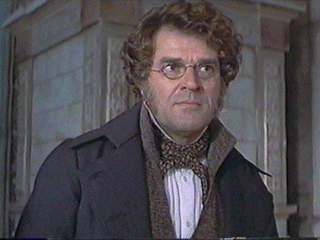If you saw Immortal Beloved thinking it would do for Beethoven what Amadeus did for Mozart, you might be severely disappointed, though you may be relieved that it does not do what Ken Russell did for Liszt in Lisztomania, for example.
Amadeus and Immortal Beloved are in many ways quite different beasts – distinct perspectives of musical genius, you might say. Jerome Krabbe‘s Anton Felix Schindler is, as narrator of the interrogation, a world apart from the devious Salieri as principle protagonist and interface with the genius. On the other hand, both contain mysteries, on which the respective narratives are hung. In this case, it is the the identity of the “immortal beloved” to whom Beethoven left his estate in his final will and testament that becomes the MacGuffin, of which more anon.
The other similarity are the exquisitely crafted soundtracks by two great musical knights, respectively Sir Neville Marriner and Sir George Solti. It is, you might justifiably believe, all about the music selected to accompany scenes from the life, though in the case of Mozart the music demonstrates amply beauty seldom seen in the life. Beethoven’s life, and music, is measured proportionately in units of passion, so the question to be answered is whether the drama portraying his life can measure up to music which knows few, if any, equals. Granted that the film focuses mainly on the better-known pieces, but nonetheless they are a joy to behold (see list below from Wikipedia.)
But… where Amadeus (1984) retains the powerful narrative drive of a grand opera, Immortal Beloved (1996) is more of a minor symphony, lacking in harmonic structure or narrative coherence. It is more episodic, dealing at times with themes such as Beethoven’s women, the conflicts in his life, his deafness and more, but does it provide insight? It likes to think so, though how far these are historically accurate is not clear. From Wikipedia:
After Beethoven’s death in 1827, a three-part letter was found among his private papers addressed to a woman whom he called “immortal beloved”. Written in the summer of 1812 from the spa town of Teplice, the letter has generated a great deal of speculation and debate amongst scholars and writers as to her identity. Among the candidates are (or were) Giulietta Guicciardi, Thérèse von Brunswick, Josephine Brunsvik, Antonie Brentano, and Anna-Marie Erdödy (some of whom appear in the film). The film’s writer and director, Bernard Rose, claimed that he had successfully identified the addressed woman as Johanna, a claim no scholar on Beethoven has endorsed (the film also implies that Karl, Beethoven’s nephew, was in reality the couple’s son.) Biographer Gail S Altman disputed Rose’s claim in a book[2] devoted specifically to the question of the woman’s identity and Beethoven’s relationships in general. See also Lewis Lockwood: “Film Biography as Travesty: Immortal Beloved and Beethoven.” The Musical Quarterly 81/2, 1997, pp. 190–198.
To be fair, there are indeed elements picked out for deeper forensic analysis in Bernard Rose‘s script and direction are Beethoven’s relationship with his brother’s wife Johanna (Johanna ter Steege) and their son, his nephew, Karl (Marco Hofschneider), whom Beethoven adopts after the death of Casper van Beethoven (Christopher Fulford) from tuberculosis…. though I will not provide any spoilers. You’ll have to watch the film for yourself up to the slightly predictable denouement.
Whether or not fictional, these are provided with a plausible case by Rose, at the centre of which is the enigmatic genius of Ludwig van Beethoven in the person of the enigmatic but charismatic actor, Gary Oldman. No doubt about it, the role demanded an actor the camera loves. Eyes gravitate towards Oldman, whatever he is doing, and he can be totally splendid, assuming directors do not allow him to go way OTT and thereby lose all credibility. Indeed, as Wikipedia cunningly puts it, “he is known for his “big” acting style and on-screen diversity.”
Oldman is at his best when underplaying the role, as in the Harry Potter series and especially in Tinker, Tailor, Soldier, Spy, for example. Greatly to his credit, he underplays Beethoven but shows underlying passion in spades, where that is required. This is appropriate, credible, naturalistic, subtle and nuanced; more specifically, it hits the nail bang on the head with the motivation of the maestro in this particular version of events, so I have no hesitation in describing this as one of Oldman’s greatest performances.
Having already praised the music, it’s also worth watching for the lush sets, glorious cinematography and fine ensemble cast headed by Oldman, so there would be no excuse for failure. In practice though, the film fails to light the blue touch paper and does not explode with passion in the way Amadeus did, which failure I put down to script and direction. But then, if you’re going to put yourself in the category of being compared with the best, you have to walk the walk. In practice, there was much damning with faint praise:
Reviews for Immortal Beloved were mixed. From the 31 reviews collected from notable publications by review aggregator Rotten Tomatoes, reviews tended towards the positive, with an overall approval rating of 58%.[3] Emanuel Levy gave the film a “C” rating, calling it a “speculative chronicle” that lacks the “vibrant energy and charm” of Wolfgang Amadeus Mozart biopic Amadeus (1984). He did, however, praise the “wonderfully recorded and inventively used” Beethoven compositions as well as the casting of Oldman, who he felt was “the perfect actor to portray the arrogant, irascible musician”.[4] Of Rotten Tomatoes’ “top critics”, Roger Ebert was highly complimentary of the film. He gave it 3½ stars out of four, stating in his review: “Immortal Beloved has clearly been made by people who feel Beethoven directly in their hearts”. He asserted that Oldman “at first seems an unlikely choice…then we see that he is right”.[5] Janet Maslin also offered a positive review, stating: “thanks to its hugely effective use of Beethoven’s most thrilling, tumultuous music, this film exerts much the same hypnotic power”. She praised the performance of Oldman, writing that “he captures Beethoven as a believably brilliant figure struggling with his deafness and other demons”.[6]
MSN Movies, in a 2011 publication, wrote: “Oldman’s performance is unimpeachable. He dives deep into the role with powerful passion and makes the audience feel the pain of the genius as he loses his hearing and fails to shape his nephew into a similarly talented musician. In the year of ‘[Forrest] Gump‘, Oldman was overlooked for a well-deserved Oscar nomination.”[7] Also that year Josh Winning of Total Film named Oldman’s portrayal of Beethoven as one of the five best performances of his career, saying: “If ever there was a better filmic chameleon than Oldman, we’ve yet to find one. Immersing himself fully into the role of the German composer, Oldman is here damn near unrecognisable.”[8]
- The Orchestra: London Symphony Orchestra, conducted by Georg Solti
- Instrumental soloists
(in order of appearance)
- Symphony No 5, Op. 67.
- Für Elise (complete).
- Symphony No 3 In E-Flat Major Op.55 Eroica.
- Piano Sonata No 14, Moonlight: Adagio Sostenuto.
- Symphony No 6, Op. 68, Pastoral: Storm.
- Piano Trio No 5 In D Major, Op. 70, No 1 Ghost.
- Violin Concerto in D Major, Op. 61.
- Piano Sonata No 8, Pathetique.
- Piano Concerto No 5, Emperor (love theme, ending credits).
- Missa Solemnis: Kyrie.
- Symphony No 7, Op. 92: Allegretto (Karl’s theme)
- Violin Sonata In A Major, Op. 47, Kreutzer: Adagio sostenuto- Presto.
- Symphony No 9, Op 125: Ode to Joy.
















